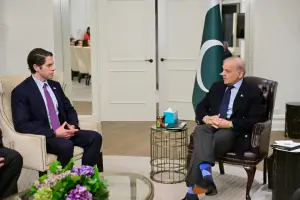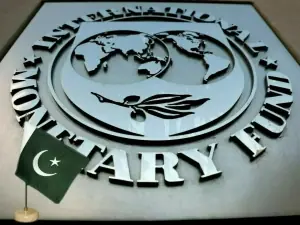Supreme Court appoints 9 amici curiae in Bhutto’s death sentence reference
6 min readThe Supreme Court of Pakistan took up a presidential reference against the death sentence of former prime minister Zulfikar Ali Bhutto on Tuesday, after a hiatus of 11 years. The last hearing was held in 2012.
Tuesday’s hearing saw the top court appoint nine amici curiae or friends of the court to assist the judges decide five questions posed to the Supreme Court. The hearing was then adjourned until January.
The proceedings were live-streamed by the Supreme Court of Pakistan via YouTube.
A nine-member bench constituted by the Chief Justice of Pakistan (CJP), Justice Qazi Faez Isa, began the hearing on Tuesday, with the top judge explaining the composition of the bench. The CJP also regretted the fact that the matter was not heard for 11 long years.
Court order
The court order issued at the end of the hearing said that it was unfortunate that the presidential reference was never fixed for hearing after November 12, 2012.
The order said that Bilawal-Bhutto Zardari’s plea for a live broadcast of the proceedings was rendered ineffective as the proceedings were live-streamed.
The court said that PPP lawyer Naik had told the bench that Bhutto’s only surviving offspring was a daughter, but that he also has eight grandchildren. The court allowed all of them to be represented in the court through lawyers.
The order said that nine amici curiae were being appointed. They included Justice (retired) Manzoor Malik, advocates Haris Rauf, Salman Safdar, Raza Rabbani, Khalid Javed, Zahid Ibrahim, Yasir Qureshi, Makhdoom Ali Khan, and Ali Ahmed Kurd.
The court also said in the written order that the government neither withdrew the reference during the past 11 years nor did it want to withdraw it now.
Proceedings
The bench, presided by the CJP, includes Justice Sardar Tariq Masood, Justice Syed Mansoor Ali Shah, Justice Yahya Afridi, Justice Aminuddin Khan, Justice Jamal Mandokhail, Justice Muhammad Ali Mazahar, Justice Syed Hasan Azhar Rizvi, and Justice Musarrat Hilali.
The CJP explained that the nine-member bench was formed after one senior judge refused to join the bench and two other judges recused themselves citing personal reasons.
CJP Isa said that the presidential reference, filed by then-president Asif Ali Zardari in 2011, was still pending before the court and had not been withdrawn by the presidents who succeeded Zardari.
PPP lawyer Farooq Naik told the court that he was representing Bilawal Bhutto-Zardari.
The attorney general read out the reference on the instruction of the chief justice.
Govt supports proceedings
The CJP asked the attorney general if the government wanted to continue the proceedings.
The attorney general, who is currently representing the caretaker government, told the court that he had received instructions that the government would support the proceedings in the presidential reference rather than withdraw it.
Naik cited a statement of Justice (retired) Nasim Hasan Shah – who was one of the judges to sign Bhutto’s death sentence — that Bhutto was hanged by the court under pressure.
Justice Nasim Hasan Shah had made the confession in newspaper and TV interviews decades after he sent Bhutto to the gallows.
Ahmed Raza Kasuri
Ahmed Raza Kasuri, who was the complainant in the FIR that led to Bhutto’s death sentence, was also in the courtroom and approached the rostrum at one point.
Kasuri said some of the political parties may use the presidential reference for political gains, so the hearing must be postponed until after the February 8 general elections.
Kasuri also raised objections to Raza Rabbani’s appointment as one of the amicus curiae and demanded only ‘neutral’ law experts should be appointed to assist the court.
Justice Mansoor asks if judgments could be revisited using presidential reference
Justice Mansoor Ali Shah raised questions about the presidential reference and asked if it could be used for revisiting a court judgement.
He said the Supreme Court of Pakistan had given a judgment in the Bhutto case and subsequently dismissed a review petition. How could an already decided case be reopened even if the court handed down a bad decision? he said.
He said he was posing constitutional questions which must be answered and that the court could not touch the Bhutto case let alone reopen it.
Five questions
A presidential reference in Pakistan poses a set of questions to the Supreme Court and seeks answers.
The presidential reference against Bhutto’s death sentence poses five questions. The following questions were originally reported by Dawn when the reference was filed in April 2011.
-
Whether the decision of the Lahore High Court as well as the Supreme Court in the murder trial against former prime minister Zulfikar Ali Bhutto meets the requirements of fundamental rights as guaranteed in the Constitution under Article 4(1) and (2a) (right of individuals to be dealt with in accordance with law), 8 (laws inconsistent with or in derogation of fundamental rights to be void), 9 (security of persons), 10A (due process), 14 (inviolability of dignity of man), 25 (equality of citizens)? If it does not, its effect and consequences?
-
Whether the conviction leading to execution of Zulfikar Ali Bhutto could be termed as a decision of the Supreme Court binding on all other courts being based upon or enunciating the principle of law in terms of Article 189 that asks the courts to follow apex court’s judgment? If not, its effect and consequences?
-
Whether in the peculiar circumstances of this case awarding and maintaining of the death sentence was justified or it could amount to deliberate murder keeping in view the glaring bias against Zulfikar Ali Bhutto?
-
Whether the decision in the case of murder trial against Zulfikar Ali Bhutto fulfils the requirements of Islamic laws as codified in the Holy Quran and the Sunnah of the Holy Prophet (PBUH)? If so, whether present case is covered by doctrine of repentance specifically mentioned in different Suras of Holy Quran: Sura Al-Nisa: verses 17 and 18, Sura Al-Baqara: verses 159, 160 and 222, Sura Al-Maida: verse 39, Sura Al-Aaraaf: verse 153, Sura Al-Nehal: verse 119, Sura Al-Taha: verse 82 as well as Sunan Ibn-e-Maaja, Chapter 171, Hadith No. 395. What are effects and consequences of doctrine of repentance?
-
Whether on the basis of conclusions arrived at and inferences drawn from the evidence/material in the case an order for conviction and sentence against Zulfikar Ali Bhutto could have been recorded?
Emotions running high

Asif Ali Zardari and Bilawal Bhutto Zardari were seen on the first row of public benches in the courtroom.
They were joined by several other PPP leaders including Raja Pervez Ashraf.
Bilawal’s sister and Zulfikar Ali Bhutto’s granddaughter Aseefa Bhutto-Zardari, meanwhile, fired an emotional tweet, questioning the country’s judiciary for its apparent failure to correct the history.
“For forty years the hands of the Supreme Court have been stained with the blood of Shaheed Zulfikar Ali Bhutto. For forty years that shame has tarnished the halls of justice,” she said.
Asif said the hearing was an opportunity for the Supreme Court “to undo a grievous wrong.”
Shortly before the court met, PPP leader Sherry Rehman told reporters outside that it was an important day for the party.
For the latest news, follow us on Twitter @Aaj_Urdu. We are also on Facebook, Instagram and YouTube.
























Comments are closed on this story.